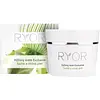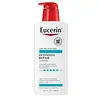What's inside
What's inside
 Key Ingredients
Key Ingredients

 Benefits
Benefits

 Concerns
Concerns

 Ingredients Side-by-side
Ingredients Side-by-side

Water
Skin ConditioningIsopropyl Myristate
EmollientParaffinum Liquidum
EmollientPetrolatum
EmollientGlycerin
HumectantOlea Europaea Fruit Oil
MaskingOzokerite
Emulsion StabilisingSorbitan Isostearate
EmulsifyingPEG-2 Hydrogenated Castor Oil
EmulsifyingRibes Nigrum Seed Oil
EmollientMagnesium Sulfate
Magnesium Stearate
Cosmetic ColorantPEG-40 Sorbitan Peroleate
EmulsifyingDiazolidinyl Urea
PreservativeSodium Benzoate
MaskingPotassium Sorbate
PreservativeHydrogenated Castor Oil
EmollientBHT
AntioxidantDisodium EDTA
Lactic Acid
BufferingParfum
MaskingAlpha-Isomethyl Ionone
PerfumingBenzyl Salicylate
PerfumingEugenol
PerfumingLimonene
PerfumingWater, Isopropyl Myristate, Paraffinum Liquidum, Petrolatum, Glycerin, Olea Europaea Fruit Oil, Ozokerite, Sorbitan Isostearate, PEG-2 Hydrogenated Castor Oil, Ribes Nigrum Seed Oil, Magnesium Sulfate, Magnesium Stearate, PEG-40 Sorbitan Peroleate, Diazolidinyl Urea, Sodium Benzoate, Potassium Sorbate, Hydrogenated Castor Oil, BHT, Disodium EDTA, Lactic Acid, Parfum, Alpha-Isomethyl Ionone, Benzyl Salicylate, Eugenol, Limonene
Paraffinum Liquidum
EmollientOctyldodecanol
EmollientCaprylic/Capric Triglyceride
MaskingIsopropyl Palmitate
EmollientSodium Lactate
BufferingUrea
BufferingGlycerin
HumectantPEG-7 Hydrogenated Castor Oil
EmulsifyingBenzyl Alcohol
PerfumingDimethicone
EmollientMethoxy PEG-22/Dodecyl Glycol Copolymer
Emulsion StabilisingPEG-45/Dodecyl Glycol Copolymer
Emulsion StabilisingMagnesium Sulfate
Lactic Acid
BufferingMicrocrystalline Wax
Emulsion StabilisingPEG-2 Hydrogenated Castor Oil
EmulsifyingSorbitan Isostearate
EmulsifyingParaffinum Liquidum, Octyldodecanol, Caprylic/Capric Triglyceride, Isopropyl Palmitate, Sodium Lactate, Urea, Glycerin, PEG-7 Hydrogenated Castor Oil, Benzyl Alcohol, Dimethicone, Methoxy PEG-22/Dodecyl Glycol Copolymer, PEG-45/Dodecyl Glycol Copolymer, Magnesium Sulfate, Lactic Acid, Microcrystalline Wax, PEG-2 Hydrogenated Castor Oil, Sorbitan Isostearate
Ingredients Explained
These ingredients are found in both products.
Ingredients higher up in an ingredient list are typically present in a larger amount.
Glycerin is already naturally found in your skin. It helps moisturize and protect your skin.
A study from 2016 found glycerin to be more effective as a humectant than AHAs and hyaluronic acid.
As a humectant, it helps the skin stay hydrated by pulling moisture to your skin. The low molecular weight of glycerin allows it to pull moisture into the deeper layers of your skin.
Hydrated skin improves your skin barrier; Your skin barrier helps protect against irritants and bacteria.
Glycerin has also been found to have antimicrobial and antiviral properties. Due to these properties, glycerin is often used in wound and burn treatments.
In cosmetics, glycerin is usually derived from plants such as soybean or palm. However, it can also be sourced from animals, such as tallow or animal fat.
This ingredient is organic, colorless, odorless, and non-toxic.
Glycerin is the name for this ingredient in American English. British English uses Glycerol/Glycerine.
Learn more about GlycerinLactic Acid is another well-loved alpha hydroxy acid (AHA). It is gentler than glycolic acid but still highly effective.
Its main role is to exfoliate the surface of the skin by loosening the “glue” that holds dead skin cells together. Shedding those old cells leads to smoother, softer, and more even-toned skin.
Because lactic acid molecules are larger than glycolic acid, they don’t penetrate as deeply. This means they’re less likely to sting or irritate, making it a great choice for beginners or those with sensitive skin.
Like glycolic acid, it can:
Lactic acid also acts as a humectant (like hyaluronic acid). It can draw water into the skin to improve hydration and also plays a role in the skin's natural moisturizing factor (NMF) in the form of sodium lactate.
Studies show it can boost ceramide production to strengthen the skin barrier and even help balance the skin’s microbiome.
To get results, choose products with a pH between 3-4.
Lower strengths (5-12%) focus on surface exfoliation; higher strengths (12% and up) can reach deeper in the dermis (deeper, supportive layer) to improve skin texture and firmness over time.
Though it was originally derived from milk, most modern lactic acid used in skincare is vegan. It is made through non-dairy fermentation to create a bio-identical and stable form suitable for all formulations.
When lactic acid shows up near the end of an ingredient list, it usually means the brand added just a tiny amount to adjust the product’s pH.
Legend has it that Cleopatra used to bathe in sour milk to help reduce wrinkles.
Lactic acid is truly a gentle multitasker: it exfoliates, hydrates, strengthens, and brightens. It's a great ingredient for giving your skin a smooth, glowing, and healthy look without the harshness of stronger acids.
Read more about some other popular AHA's here:
Learn more about Lactic AcidMagnesium Sulfate is a salt. More specifically, it is an epsom salt, or the bath salt used to help relieve muscle aches.
Despite having ‘sulfate’ in the name, it isn’t a surfactant or cleansing agent like sodium lauryl sulfate. Unlike those sulfates, magnesium sulfate doesn’t have the same cleansing or foaming properties (it's simply a type of salt).
In cosmetics, Magnesium Sulfate is used to thicken a product or help dilute other solids. It is a non-reactive and non-irritating ingredient.
One study shows magnesium deficiency may lead to inflammation of the skin. Applying magnesium topically may help reduce inflammation.
You can find this ingredient in sea water or mineral deposits.
Learn more about Magnesium SulfateParaffinum Liquidum is also known as liquid paraffin. It is a type of highly refined mineral oil.
Like other oils, Paraffinum Liquidum has emollient properties. Emollients help soothe and soften the skin. By creating a barrier to trap moisture within, emollients help keep your skin hydrated.
Paraffinum Liquidum does not irritate the skin and is non-comedogenic.
Learn more about Paraffinum LiquidumPEG-2 Hydrogenated Castor Oil is an oil and isn't fungal acne safe.
Sorbitan Isostearate is an emulsifer and cleaning agent. It is created from isostearic acid and sorbitol.
As an emulsifier, Sorbitan Isostearate prevents oils and water from separating.
Due to its isostearic acid base, it may not be safe for Malassezia or fungal acne.
Learn more about Sorbitan Isostearate